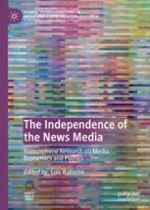2020 | OriginalPaper | Chapter
12. Tunisian Post-2011 Private Presses: Economic and Political Mutations
Authors : Enrique Klaus, Olivier Koch
Published in: The Independence of the News Media
Publisher: Springer International Publishing
Activate our intelligent search to find suitable subject content or patents.
Select sections of text to find matching patents with Artificial Intelligence. powered by
Select sections of text to find additional relevant content using AI-assisted search. powered by
